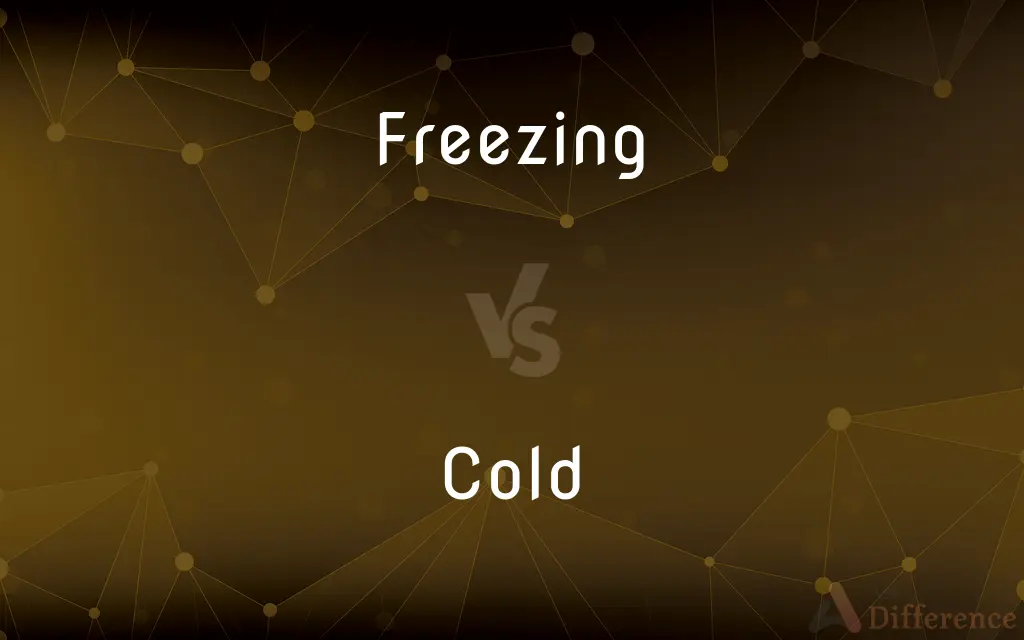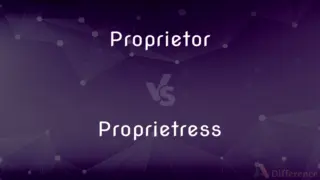Freezing vs. Cold — What's the Difference?

Difference Between Freezing and Cold
ADVERTISEMENT
Compare with Definitions
Freezing
Freezing is a phase transition where a liquid turns into a solid when its temperature is lowered below its freezing point. In accordance with the internationally established definition, freezing means the solidification phase change of a liquid or the liquid content of a substance, usually due to cooling.
Cold
Cold is the presence of low temperature, especially in the atmosphere. In common usage, cold is often a subjective perception.
Freezing
To pass from the liquid to the solid state by loss of heat.
Cold
Having a low temperature
Cold water.
Freezing
To acquire a surface or coat of ice from cold
The lake froze over in January. Bridges freeze before the adjacent roads.
ADVERTISEMENT
Cold
Being at a temperature that is less than what is required or what is normal
Cold oatmeal.
Freezing
To become clogged or jammed because of the formation of ice
The pipes froze in the basement.
Cold
Chilled by refrigeration or ice
Cold beer.
Freezing
To be at that degree of temperature at which ice forms
It may freeze tonight.
Cold
Feeling no warmth; uncomfortably chilled
We were cold sitting by the drafty windows.
Freezing
To be killed or harmed by cold or frost
They almost froze to death. Mulch keeps garden plants from freezing.
Cold
Appearing to be dead; unconscious
Found him out cold on the floor.
Freezing
To be or feel uncomfortably cold
Aren't you freezing without a coat?.
Cold
Dead
Was cold in his grave.
Freezing
To become fixed, stuck, or attached by or as if by frost
The lock froze up with rust.
Cold
Lacking emotion; objective
Cold logic.
Freezing
To stop functioning properly, usually temporarily
My computer screen froze when I opened the infected program.
Cold
Having little appeal to the senses or feelings
A cold decor.
Freezing
To become motionless or immobile, as from surprise or attentiveness
I heard a sound and froze in my tracks.
Cold
Designating or being in a tone or color, such as pale gray, that suggests little warmth.
Freezing
To become unable to act or speak, as from fear
Froze in front of the audience.
Cold
Not affectionate or friendly; aloof
A cold person.
A cold nod.
Freezing
To become rigid and inflexible; solidify
An opinion that froze into dogma.
Cold
Exhibiting or feeling no enthusiasm
A cold audience.
A cold response to the new play.
A concert that left me cold.
Freezing
To convert into ice.
Cold
Devoid of sexual desire; frigid.
Freezing
To cause ice to form upon.
Cold
Having lost all freshness or vividness through passage of time
Dogs attempting to catch a cold scent.
Freezing
To cause to congeal or stiffen from extreme cold
Winter cold that froze the ground.
Cold
So intense as to be almost uncontrollable
Cold fury.
Freezing
To preserve (foods, for example) by subjecting to freezing temperatures.
Cold
Characterized by repeated failure, especially in a sport or competitive activity
The team fell into a slump of cold shooting.
Freezing
To damage, kill, or make inoperative by cold or by the formation of ice.
Cold
To an unqualified degree; totally
Was cold sober.
Freezing
To make very cold; chill.
Cold
With complete finality
We turned him down cold.
Freezing
To immobilize, as with fear or shock.
Cold
Without advance preparation or introduction
Took the exam cold and passed.
Walked in cold and got the new job.
Freezing
To chill with an icy or formal manner
Froze me with one look.
Cold
Relative lack of warmth
Cold slows down chemical reactions.
Freezing
To stop the motion or progress of
The negotiations were frozen by the refusal of either side to compromise.
Froze the video in order to discuss the composition of the frame.
Cold
The sensation resulting from lack of warmth; chill.
Freezing
To fix (prices or wages, for example) at a given or current level.
Cold
A condition of low air temperature; cold weather
Went out into the cold and got a chill.
Freezing
To prohibit further manufacture or use of.
Cold
A viral infection characterized by inflammation of the mucous membranes lining the upper respiratory passages and usually accompanied by malaise, fever, chills, coughing, and sneezing. Also called common cold, coryza.
Freezing
To prevent or restrict the exchange, withdrawal, liquidation, or granting of by governmental action
Freeze investment loans during a depression.
Froze foreign assets held by US banks.
Cold
(of a thing) Having a low temperature.
A cold wind whistled through the trees.
Freezing
To anesthetize by chilling.
Cold
(of the weather) Causing the air to be cold.
The forecast is that it will be very cold today.
Freezing
(Sports) To keep possession of (a ball or puck) so as to deny an opponent the opportunity to score.
Cold
(of a person or animal) Feeling the sensation of coldness, especially to the point of discomfort.
She was so cold she was shivering.
Freezing
The act of freezing.
Cold
Unfriendly; emotionally distant or unfeeling.
She shot me a cold glance before turning her back.
Freezing
The state of being frozen.
Cold
Dispassionate; not prejudiced or partisan; impartial.
Let's look at this tomorrow with a cold head.
He's a nice guy, but the cold facts say we should fire him.
The cold truth is that states rarely undertake military action unless their national interests are at stake.
Freezing
A spell of cold weather; a frost.
Cold
Completely unprepared; without introduction.
He was assigned cold calls for the first three months.
Freezing
A restriction that forbids a quantity from rising above a given or current level
A freeze on city jobs.
A proposed freeze on the production of nuclear weapons.
Cold
Unconscious or deeply asleep; deprived of the metaphorical heat associated with life or consciousness.
I knocked him out cold.
After one more beer he passed out cold.
Freezing
(literally) Suffering or causing frost
Cold
(usually with "have" or "know" transitively) Perfectly, exactly, completely; by heart; down pat.
Practice your music scales until you know them cold.
Try both these maneuvers until you have them cold and can do them in the dark without thinking.
Rehearse your lines until you have them down cold.
Keep that list in front of you, or memorize it cold.
Freezing
Very cold
Cold
(usually with "have" transitively) Cornered; done for.
With that receipt, we have them cold for fraud.
Criminal interrogation. Initially they will dream up explanations faster than you could ever do so, but when they become fatigued, often they will acknowledge that you have them cold.
Freezing
Zero °C, the freezing point of water.
Cold
(obsolete) Not pungent or acrid.
Freezing
The change in state of a substance from liquid to solid by cooling to a critically low temperature.
Cold
(obsolete) Unexciting; dull; uninteresting.
Freezing
The action of numbing with anesthetics.
Cold
Affecting the sense of smell (as of hunting dogs) only feebly; having lost its odour.
A cold scent
Freezing
Present participle of freeze
Cold
(obsolete) Not sensitive; not acute.
Freezing
Tending to freeze; for freezing; hence, cold or distant in manner.
Cold
Distant; said, in the game of hunting for some object, of a seeker remote from the thing concealed. Compare warm and hot.
You're cold … getting warmer … hot! You've found it!
Freezing
The withdrawal of heat to change something from a liquid to a solid
Cold
(painting) Having a bluish effect; not warm in colour.
Cold
(databases) Rarely used or accessed, and thus able to be relegated to slower storage.
Cold
(informal) Without compassion; heartless; ruthless.
I can't believe she said that...that was cold!
Cold
(informal) Not radioactive.
Cold
(firearm) Not loaded with a round of live ammunition.
Cold
Without electrical power being supplied.
Cold
A condition of low temperature.
Come in, out of the cold.
Cold
A harsh place; a place of abandonment.
The former politician was left out in the cold after his friends deserted him.
Cold
(medicine) A common, usually harmless, viral illness, usually with congestion of the nasal passages and sometimes fever.
I caught a miserable cold and had to stay home for a week
Cold
(slang) rheum, sleepy dust
Cold
At a low temperature.
The steel was processed cold.
Cold
Without preparation.
The speaker went in cold and floundered for a topic.
Cold
In a cold, frank, or realistically honest manner.
Cold
Deprived of heat, or having a low temperature; not warm or hot; gelid; frigid.
Cold
Lacking the sensation of warmth; suffering from the absence of heat; chilly; shivering; as, to be cold.
Cold
Not pungent or acrid.
Cold
Wanting in ardor, intensity, warmth, zeal, or passion; spiritless; unconcerned; reserved.
A cold and unconcerned spectator.
No cold relation is a zealous citizen.
Cold
Unwelcome; disagreeable; unsatisfactory.
Cold
Wanting in power to excite; dull; uninteresting.
What a deal of cold business doth a man misspend the better part of life in!
The jest grows cold . . . when in comes on in a second scene.
Cold
Affecting the sense of smell (as of hunting dogs) but feebly; having lost its odor; as, a cold scent.
Cold
Not sensitive; not acute.
Smell this business with a sense as coldAs is a dead man's nose.
Cold
Distant; - said, in the game of hunting for some object, of a seeker remote from the thing concealed.
Cold
Having a bluish effect. Cf. Warm, 8.
He was slain in cold blood after the fight was over.
Cold
The relative absence of heat or warmth.
Cold
The sensation produced by the escape of heat; chilliness or chillness.
When she saw her lord prepared to part,A deadly cold ran shivering to her heart.
Cold
A morbid state of the animal system produced by exposure to cold or dampness; a catarrh.
Cold
To become cold.
Cold
A mild viral infection involving the nose and respiratory passages (but not the lungs);
Will they never find a cure for the common cold?
Cold
The absence of heat;
The coldness made our breath visible
Come in out of the cold
Cold is a vasoconstrictor
Cold
The sensation produced by low temperatures;
He shivered from the cold
The cold helped clear his head
Cold
Used of physical coldness; having a low or inadequate temperature or feeling a sensation of coldness or having been made cold by e.g. ice or refrigeration;
A cold climate
A cold room
Dinner has gotten cold
Cold fingers
If you are cold, turn up the heat
A cold beer
Cold
Extended meanings; especially of psychological coldness; without human warmth or emotion;
A cold unfriendly nod
A cold and unaffectionate person
A cold impersonal manner
Cold logic
The concert left me cold
Cold
Having lost freshness through passage of time;
A cold trail
Dogs attempting to catch a cold scent
Cold
(color) giving no sensation of warmth;
A cold bluish gray
Cold
Marked by errorless familiarity;
Had her lines cold before rehearsals started
Cold
No longer new; uninteresting;
Cold (or stale) news
Cold
So intense as to be almost uncontrollable;
Cold fury gripped him
Cold
Sexually unresponsive;
Was cold to his advances
A frigid woman
Cold
Without compunction or human feeling;
In cold blood
Cold-blooded killing
Insensate destruction
Cold
Feeling or showing no enthusiasm;
A cold audience
A cold response to the new play
Cold
Unconscious from a blow or shock or intoxication;
The boxer was out cold
Pass out cold
Cold
Of a seeker; far from the object sought
Cold
Lacking the warmth of life;
Cold in his grave
Share Your Discovery

Previous Comparison
Feature vs. Landmark
Next Comparison
Proprietor vs. Proprietress














































